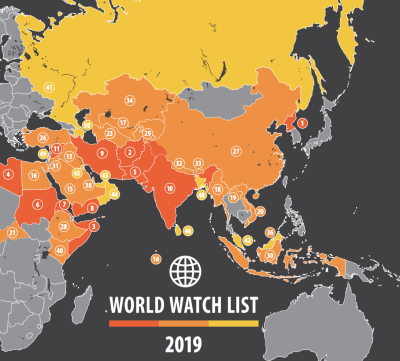Alarm bells against discrimination

Fortunately, the media are increasingly reporting about persecution of people on account of their religion. This no longer happens only on particularly news-worthy occasions.
For example, if a dozen Christians die in Egypt in an attack on a bus on its way to a desert monastery, or if a symbolic person, like Asia Bibi in Pakistan, is sentenced to death for alleged blasphemy, or if hundreds of thousands of Muslim Rohingya are driven out of Myanmar. In the past, it often required a statement by public figures. First, politicians or bishops had to comment, to give enough weight to the matter.
Nevertheless, until today most incidents do not make it into the mass media. There are just so many of them. Many of them occur in remote corners of the earth hardly anyone elsewhere is really interested. Therefore the publication of documentations on persecution and discrimination against Christians is important as they inform in a systematic way. At the same time they raise attention and give occasion for additional media events on the matter. One example is the bi-annual Religious Freedom Report of Aid to the Church in Need, which highlights improvements and deteriorations. Another example, that is only available in German, are the yearbooks on religious freedom and on discrimination and persecution of Christians, which amalgamate some of the most important information and articles of each year.
However, some people do not put much value to country comparisons, and frown even more on any rankings. Some overlook the fact that comparisons and rankings usually only represent the tip of the iceberg of a much richer information offer. Therefore, this contribution aims to present the different types of global surveys and comparisons of the level of religious freedom or persecution of Christians in different countries and to argue for their usefulness.
Databases
Databases arranged by country, including newscasts on individual incidents, analyses, comments and events, provide a preliminary stage to systematizing world surveys. News casts are generated by several specialized news services, such as WorldWatch Monitor and Morning Star News, and by Christian news services and magazines. Additionally, countless individual reports are produced by relevant Christian organizations and networks focusing on the topic, some of which are displayed on portals such as One We Stand.
Large databases of such news are provided by several research institutions. The International Institute for Religious Freedom archives the collection of media reports on religious freedom collated daily as a digest by the US Commission on International Religious Freedom. This is searchable by countries, religions, victims and perpetrators. Human Rights without Frontiers provides a database of static annual country-by-country compilations on freedom for religion and belief, derived from a variety of sources. The International Center for Law and Religion Studies of the Brigham Young University Law School offers law and religion headlines on an international, European and US level.
However, with all these offerings it is up to the user to combine the random news items, reports and analyses into an overall picture of the situation of any given country, provided that the information is sufficient and the necessary background knowledge available. Therefore, beyond all this, systematic, analytical and interpretative approaches are necessary to facilitate a comparison of countries or global overviews.
Global Surveys
Some of these global surveys inform about the persecution and discrimination of Christians country by country or region by region. Others concentrate on different particular topics like the fate of prisoners of conscience, or add such additional topics to their country surveys. A few of the surveys also attempt to compare between the different countries and to score them. One such example is the report of the Pew Research Center (Washington, DC) on restrictions of religious freedom by governments and social hostilities based on religion. The result is displayed on a matrix, dividing the countries into different groups.
Only few institutions or groups have sufficient staff and resources to cover the majority of the world’s countries in their reports and to do so annually and in detail. The State Department of the United States of America is currently taking the lead with its annual “International Religious Freedom Report”. However, a rudimentary rating of countries only occurs after publication, and it is a political exercise. The US government then declares a few countries to be “countries of particular concern”. However, the procedure is mitigated by foreign policy considerations and usually has more of a symbolic effect.
Other reports focus only on a selection of countries of particular concern, such as the annual report of the US Commission on International Religious Freedom, which applies a rudimentary classification.
Country Rankings
Then there are country rankings such as the Freedom of Thought Report of the International Humanist and Ethical Union or the World Watch List on persecution of Christians issued by the charity Open Doors. The latter excels in being up to date, as it appears already 10 weeks after the completion of the time frame under examination. It has an exceptional proximity to the Christian grassroots in the countries most intensely affected, particularly among evangelical and Pentecostal churches. In addition it demonstrates a special sensitivity for the fate of converts, who – as might be known – are more frequently intensely persecuted than most other Christians.
Such global indexes are available on about 50 different topics, such as freedom of the press, corruption, war casualties, human development, etc. In these rankings all the countries examined are individually evaluated according to the same standards and then scored and ranked.
What are the benefits? With regard to persecution and discrimination against Christians, this helps not to lose sight of situations that are catching less attention, i.e. situations of prolonged pressure rather than horrific violence. I mean countries in which the legal situation gradually deteriorates over the years and religious freedom is increasingly restricted, such as China. An index, if produced at regular intervals, such as annually or bi-annually, may draw attention to improvements or deteriorations of situations, such as the mass closure of churches in Angola towards the end of 2018, or an increase of arrests as in Iran. In such instances, an index can act like an alarm bell. It draws attention to a situation that would otherwise be overlooked.
And what are the limitations of rankings? There is one thing they can do best – to attract attention, and to indicate: “Watch out, you have to check this out more deeply!” For example, when you find Afghanistan close to the top of the World Watch List, you should read up the country dossier, in order to get a better understanding of the situation. Rankings in isolation would remain superficial, and overemphasizing rankings could possibly be misleading.
It is characteristic of all rankings that they inevitably remain fuzzy. However conscientious the analysts may be, the results usually depend on numerous different variables. The problem is that nobody can tell with certainty, how exactly all these variables must be weighed among each other.
In the World Watch List, for example, the factor of violence against Christians contributes to one sixth of the overall country score. The remainder is reserved for the pressure in different areas of life and on church life as a whole. If, instead, less emphasis were to be placed on violence, the order of the 73 most problematic countries within the ranking would shift considerably. However, countries that had previously performed very well would not suddenly appear at the opposite end of the country ranking. Due to these limitations of rankings, it is therefore helpful that Open Doors provides numerous additional rankings on various other issues, in addition to the overall ranking of the World Watch List, such as rankings of the number of fatalities, persons displaced, churches destroyed, etc.
Different user groups
The various user groups, such as politicians, journalists, activists and church people, may use global rankings on persecution for different purposes.
For politicians it is important to have information on which countries to prioritize in their efforts to promote freedom of religion or Belief. The European Parliament Intergroup on Freedom of Religion or Belief and Religious Tolerance has made the suitability for setting priorities a crucial criterion in the preparation of its latest report. Additionally, politicians need an overview on the individual countries in order to see the big picture beyond daily newsfeeds, individual incidents or moving individual fates.
The issue is quite similar for human rights organizations and Christian ministries concerned with religious freedom and the persecution of Christians. They need to use their limited funds wisely. They too must set priorities. At the same time, however, they do not want to overlook new developments and want to be able to react promptly and appropriately to deteriorating situations. Regular stocktaking therefore, will be crucial for them, including the availability of comparative metrics.
Journalists are naturally eager to publish numbers. What counts for them are the out-of-the-ordinary and superlatives. That is why indexes and rankings are popular with journalists. In addition journalists, by virtue of their profession, need to communicate in a way that everyone can understand and seek to give vivid or even graphic accounts. When doing so, they might easily succumb to the temptation to simplify inappropriately and to give numbers and rankings a higher value than they actually deserve.
For Christian churches, global surveys should first and foremost guide them to intercession, not only for the top of a list among particularly problematic countries, but irrespective of their ranking. Christians everywhere need courage to confess their faith. After all, the Gospel needs to become known everywhere, even in places where few people personally know any Christian. Where are the congregations and churches that regularly pray by name for countries in which Christians are under particularly severe pressure? If a church were to pray for the people in only two countries every Sunday, eventually all 100 countries for which detailed information is available in the World Watch List documentation, will be prayed for in the course of one year. When using the report of the Catholic mission Aid to theChurch in Need, one could even pray for four countries per week. And, should this not take place in one’s own church, every Christian can pray at home. Many agencies also offer prayer diaries and up to date news which can be subscribed for that purpose.
Doing the right thing
Used wisely, global surveys and country comparisons on persecution will fulfill an important function and be very beneficial. At the same time, the various reports complement one another – those that do not attempt any rankings and attempt to manage without any metrics, and others that do.
It is important that we heed these alarm signals and subsequently take the necessary action for the benefit of oppressed and persecuted Christians, everybody according to their position and capabilities.




























